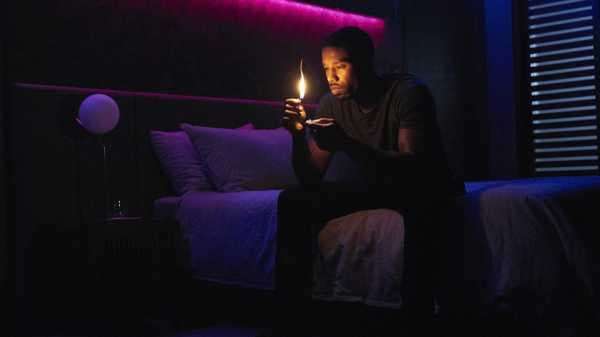
Michael Shannon has made a fine career out of giving you the heebie-jeebies. HBO’s feature-film adaptation of Ray Bradbury’s “Fahrenheit 451” (airing Saturday) casts him to type as an enforcer of despotic power. But in the role of Captain Beatty—the book-burning superior of the film’s hero, Guy Montag, played by Michael B. Jordan—Shannon’s venomous glares and cinderblock grins only elicit the faintest shiver of dread. The actor’s failure to supply a proper freak-out goes toward the tepidness of this “Fahrenheit,” which has a real feel of about fifty-eight.
It’s partly cloudy. When the novel first appeared, in 1953, its dystopian vision was clear and forceful, which is among the reasons it ranks as great science fiction without quite being a great book. It was a good year for anxiety about the Cold War, and the mass media, and the conformist values promoted by each. Guy Montag is a “fireman” who worked torching books in an America where any text stimulating independent thought ranked as contraband.
In 2018, this adaptation speaks to the apotheosis of social media, to the approach of authoritarianism, and to any other anxieties about the self-surveillance state that you might harbor. The era it depicts begins after a “second Civil War” leaves eight million dead. The vague description of this conflict, and of the corporatized state that emerged from it, shrouds much amorphous portent in its haze.
In the perilously near future of this boilerplate dystopia, a digital system called “the Nine” has supplanted our “savage Internet,” as Captain Beatty puts it, during a dangerously mediocre speech. Every glassy surface is a screen, such that the faces of bathroom mirrors and the façades of glass towers percolate with blips of data. The classics of literature have been condensed into one-paragraph emoji rebuses. The propaganda slogans of “the Ministry” swell like taglines for a soda brand slugged to chase Victory Gin: “Happiness is Truth.” “Freedom is Choice.” “Self is Strength.” The citizens, obeying their thirsts, drink in sedating information through psychoactive eye drops. The Nine broadcasts the exploits of firemen in much the same way that A & E airs traffic stops on “Live PD” (a real show beginning a new season in the perilously near future of early June).
In the HBO adaptation, firemen burn not only books but also any analog delivery system—vinyl albums, video cassettes, picture postcards—that might encourage inconvenient questions. The movie is set in Cleveland, where Montag is a rising star in the fire department. But he’s been nurturing some doubts, which blossom after he pockets a copy of “Notes from the Underground” when responding to a call. His development as a traitor to the Ministry flourishes in parallel with his affair with Clarisse (Sofia Boutella), a character reconfigured as a member of a resistance group—a glamorous scavenger with a bedraggled bob and a defiant stare, like a polyglot waif from a Jason Bourne thriller. The romance does not seem believable, and Jordan seems to be among the people whose credulity it strains. His performance is muted and delicate, as if the part is a fragile thing that requires gentle handling. But he nuzzles with the lady, and they read Dostoyevsky, and the movie, raising the stakes at a sharp pace, wobbles into a quest to preserve the sum of human knowledge.
The more interesting romance in the film is between Montag and Beatty. The relationship between them opens with their boxing for sport, sparring in gloves, surrounded by hooting colleagues, under a gray-green light borrowed from a David Fincher film. Together in uniform, with the metal clasps of their leather jackets contributing a despotic swank, they make quite a pair. The dynamic is partly paternalistic: Montag entered his line of work as a boy. Though he has subscribed to the narrative that, as a fireman, he is marching in the proud footsteps of his father, the plot sees him recovering memories that suggest otherwise. I’m not exactly sure what this has to do with Montag’s development from a loyal book-burner to a flaming dissident, and neither is the film. But the quick sketch of the machismo of fascism makes a searing impression.
Sourse: newyorker.com






